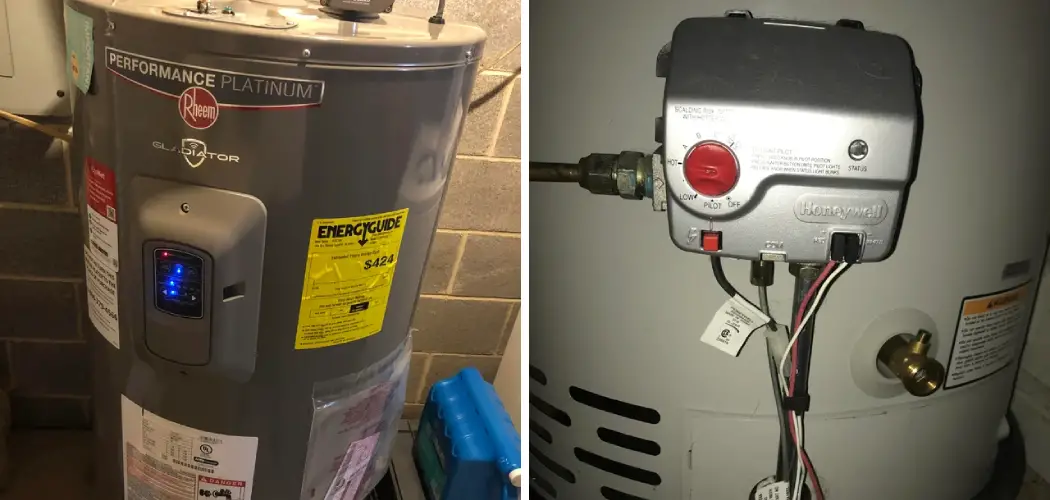A beeping water heater can be a nuisance, disrupting your home’s peace and potentially indicating an underlying issue that needs attention. Whether your water heater is emitting occasional beeps or constant alarms, it’s essential to address the problem promptly to restore tranquility and ensure the heater’s proper function.
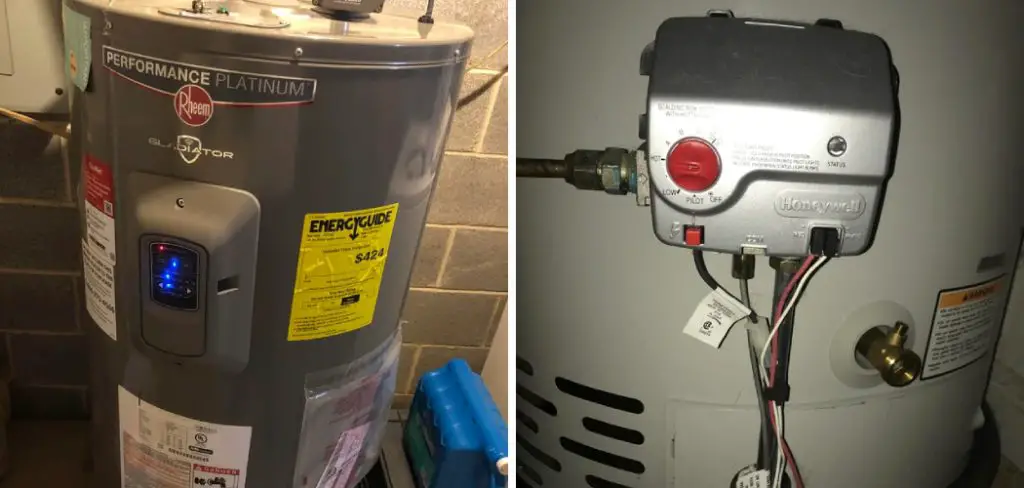
Fortunately, there are several steps you can take to stop a water heater from beeping. From troubleshooting common causes such as low battery signals in digital displays or malfunctioning sensors to checking for error codes and resetting the unit, understanding these methods can help you silence the beeping and resolve any underlying issues efficiently.
In this article, we’ll explore various techniques and tips for how to stop water heater from beeping, allowing you to enjoy a quiet and smoothly operating household once again.
Causes of Water Heater Beeping
The incessant beeping from a water heater can stem from a variety of issues, each signaling a different concern or malfunction. These causes range from the relatively simple to more complex problems that might require professional intervention:
- Low Battery Power in Digital Models: Many modern water heaters are equipped with digital displays that rely on batteries. A low battery power warning can result in continuous beeping to alert you to replace the batteries.
- High Water Temperature: If the water temperature exceeds the preset safety limits, the heater may beep as a precautionary measure to prevent scalding accidents and to indicate potential malfunctioning of the thermostat.
- Water Leak Detection: Some water heaters have built-in sensors to detect leaks. These sensors can trigger an alarm if moisture is detected outside of the unit, indicating a possible leak that needs immediate attention.
- Sediment Build-Up: Accumulation of sediment at the bottom of the tank can cause overheating and unusual sounds, including beeping, as the heater works harder to heat the water.
- Pressure Relief Valve Activation: The pressure relief valve may emit a beeping sound if it opens, which is its way of dealing with excess pressure or temperature inside the tank, signaling an urgent safety concern.
- Faulty Heating Elements or Sensors: Malfunctioning heating elements or sensors within the unit can lead to improper functioning and trigger the alarm system as a warning sign of internal issue.
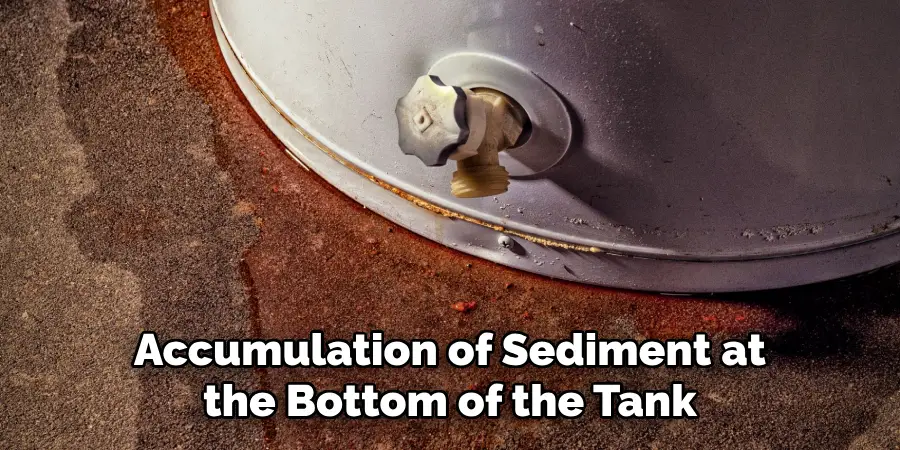
By identifying the specific cause of the beeping, homeowners can take the appropriate steps towards troubleshooting and fixing the problem, ensuring the water heater operates safely and efficiently.
Importance of Addressing Beeping Promptly
Ignoring the beeping sounds from a water heater is not advisable, as these alarms are designed to alert homeowners to potential problems that, if left unattended, could escalate into more serious issues. Promptly addressing these beeps can result in several key benefits:
- Preventing Damage: Early intervention can prevent minor issues from becoming major problems that might require costly repairs or even replacement of the water heater unit.
- Safety: Some beeping alerts, such as those for high water temperature or pressure relief valve activation, are directly linked to safety mechanisms designed to prevent hazardous situations. Addressing these alarms promptly can help avoid risks of overheating, explosion, or scalding injuries.
- Efficiency and Longevity: Resolving issues signaled by beeping can help maintain the heater’s efficiency, ensuring it operates at optimal performance and potentially extending its lifespan by preventing wear and tear from unresolved issues.
- Cost Savings: By promptly addressing the causes of beeping, homeowners can avoid the higher energy bills associated with an inefficiently running water heater and save money on emergency repair costs.
Understanding the significance of a beeping water heater and taking immediate action to investigate and resolve the issue can protect your home, save money, and ensure your water heating system remains in good working condition.
Understanding Water Heater Alarm Systems
Modern water heaters are equipped with sophisticated alarm systems designed to alert homeowners to potential issues before they escalate into serious problems. These alarm systems, integral to the heater’s operation, play a crucial role in maintenance and safety.

They utilize a series of beeps or audible alerts to signal various conditions such as high temperature, pressure issues, or internal malfunctions. Some models also feature digital displays that provide error codes, offering a precise diagnosis of the issue at hand. Understanding how these alarm systems work and what the different signals mean is essential for any homeowner.
It enables prompt response to potential issues, ensuring the safety, efficiency, and longevity of the water heater. Familiarizing yourself with the user manual of your specific water heater model can provide valuable insights into interpreting these alarms and taking appropriate action.
Common Types of Water Heater Alarms
Water heaters are equipped with various alarms to notify homeowners of specific issues or malfunctions. Recognizing these common alarm types can greatly aid in troubleshooting and resolving problems efficiently. Here are some of the most frequently encountered water heater alarms:
- Temperature Alarm: This alarm activates when the water temperature exceeds or falls below the heater’s preset safety limits. A high-temperature alarm suggests a risk of scalding water, whereas a low-temperature alarm could indicate insufficient heating capability.
- Leak Detection Alarm: Designed to prevent water damage and mold growth, this alarm sounds off when the water heater detects moisture in places it shouldn’t be. Leak detection is crucial for maintaining the integrity of your home’s structure and preventing water waste.
- Pressure Relief Alarm: To mitigate the risk of pressure build-up, this alarm alerts you when the pressure inside the tank exceeds safe levels. It is an essential feature for preventing potential damage or explosion.
- Sediment Build-Up Alarm: Some advanced water heaters feature an alarm for sediment build-up, which can impact heating efficiency and increase energy consumption. This alarm prompts the homeowner to service the unit, usually involving flushing to remove sediment.
- Gas Leak Alarm: For gas water heaters, a gas leak alarm is critical for ensuring safety. This alarm detects the presence of natural gas or carbon monoxide, alerting homeowners to potential leaks that could lead to fire hazards or poisoning.
- Power Failure Alarm: In the event of a power outage or if the unit is unintentionally disconnected from power, this alarm will sound to inform the homeowner that the water heater is not operational and needs attention.
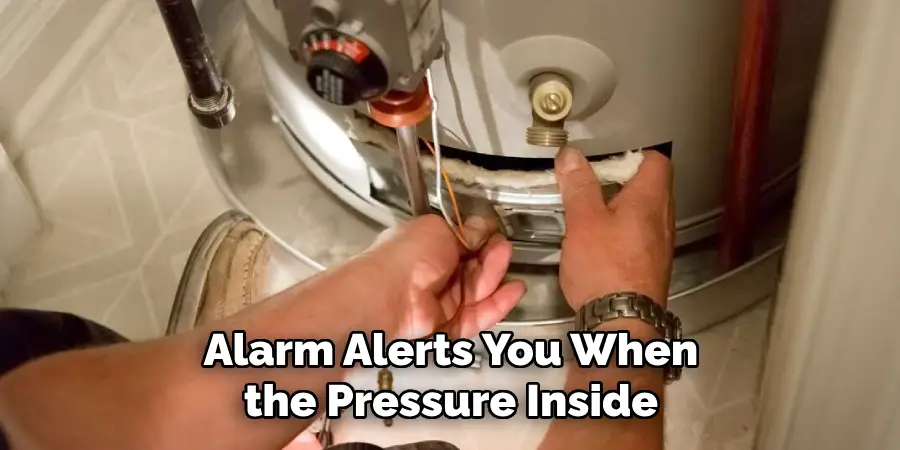
Potential Reasons for Alarm Activation
Alarm activation on water heaters can be triggered by a variety of factors, each indicating a specific concern that requires attention. Understanding these potential reasons can help homeowners diagnose issues quickly and take corrective action. Here are some common factors that could cause water heater alarms to go off:
- Overheating: If the water heater’s temperature exceeds its designed limits, an overheating alarm may activate. This could be due to malfunctioning thermostats, heating elements, or inadequate water flow.
- Pressure Buildup: An unusually high pressure inside the tank, possibly due to a malfunctioning pressure relief valve or an overproduction of hot water, can trigger a pressure-related alarm.
- Electrical Issues: For electric water heaters, wiring problems, circuit failures, or power surges can interrupt normal operation and activate an alarm signal.
- Water Leakage: Leaks from the tank or connecting pipes can prompt a leak detection alarm. Such leaks can result from corrosion, loose connections, or damaged seals.
- Sediment Accumulation: Excessive buildup of sediment at the bottom of the tank can hinder the water heating process, potentially triggering alarms designed to alert homeowners to maintenance needs such as tank flushing.
- Gas or Carbon Monoxide Leakage: In gas water heaters, the detection of natural gas or carbon monoxide leakage can activate a specific alarm, signaling a serious and immediate safety hazard.
- Failed Safety Tests: Some water heaters perform periodic self-checks or safety tests. Failure in these tests, which might indicate malfunctioning components or unsafe operational conditions, can lead to alarm activation.
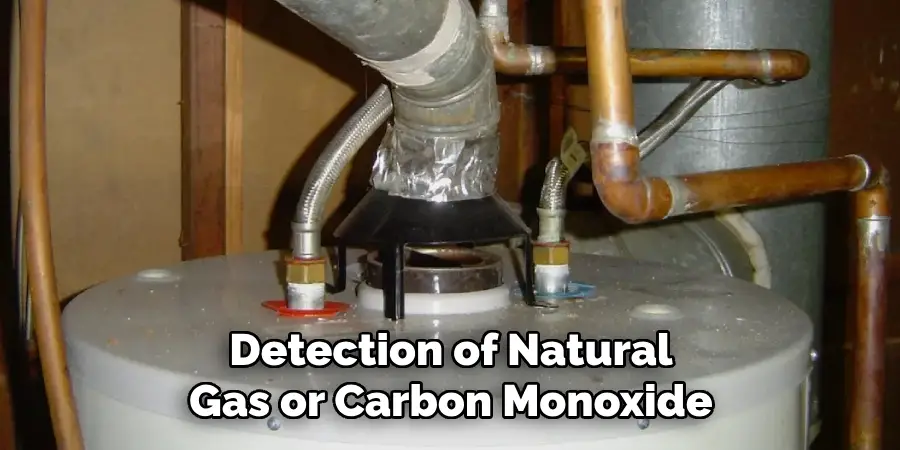
10 Methods How to Stop Water Heater from Beeping
1. Check the Display Panel:
If your water heater has a digital display panel, the beeping may be accompanied by error codes or messages. Check the display panel to see if any error codes are indicated. These codes can provide valuable information about the cause of the beeping and guide your troubleshooting efforts.
2. Replace the Batteries:
Many modern water heaters are equipped with digital controls or displays that require batteries to function. If the beeping is intermittent or accompanied by a low battery indicator, replacing the batteries in the control panel may stop the beeping. Refer to the manufacturer’s instructions for guidance on battery replacement.
3. Reset the Water Heater:
Sometimes, a simple reset can resolve issues with a beeping water heater. Locate the reset button on the control panel or power supply unit of the water heater and press it to reset the system. Wait for a few minutes to see if the beeping stops. If not, proceed with further troubleshooting steps.
4. Check for Overheating:
An overheating water heater can trigger beeping alarms as a safety measure. Check the temperature settings on the water heater and ensure they are not set too high. Additionally, inspect the heating elements and thermostat for signs of malfunction or damage that could cause overheating.
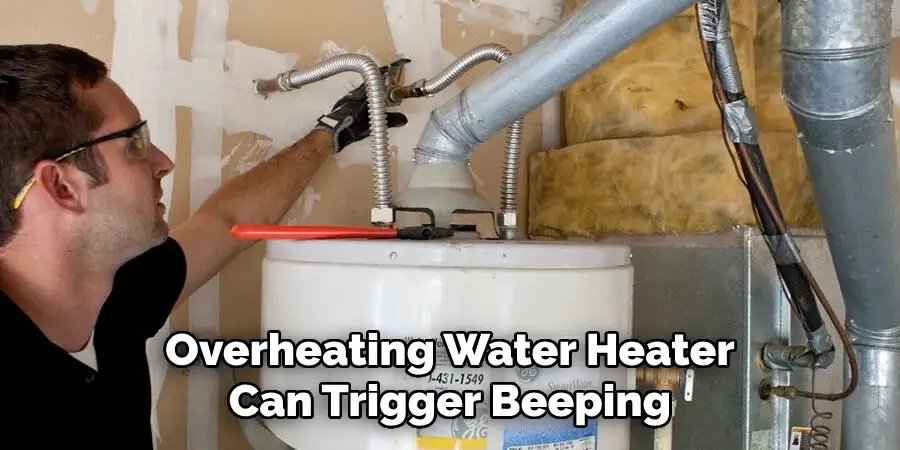
5. Inspect the Pressure Relief Valve:
The pressure relief valve is a critical safety component of a water heater that releases excess pressure to prevent tank rupture. If the beeping is accompanied by water leakage from the pressure relief valve, it may indicate high pressure inside the tank. Inspect the valve for leaks or signs of damage and replace it if necessary.
6. Check for Water Leaks:
Water leaks around the base of the water heater or from fittings and connections can trigger beeping alarms, especially if water comes into contact with electrical components. Inspect the water heater and surrounding area for any signs of leakage and repair any leaks promptly to prevent further issues.
7. Inspect the Venting System:
Improper venting can cause gas water heaters to emit beeping alarms as a safety precaution. Check the venting system for blockages, obstructions, or damage that could impede proper ventilation. Clear any debris or obstructions from the vent pipes and ensure they are installed according to manufacturer specifications.
8. Check Gas Supply and Ignition System:
If you have a gas water heater, beeping alarms may indicate issues with the gas supply or ignition system. Check that the gas supply valve is open and that the pilot light or igniter is functioning correctly. If you suspect a gas leak, shut off the gas supply immediately and contact a professional for assistance.
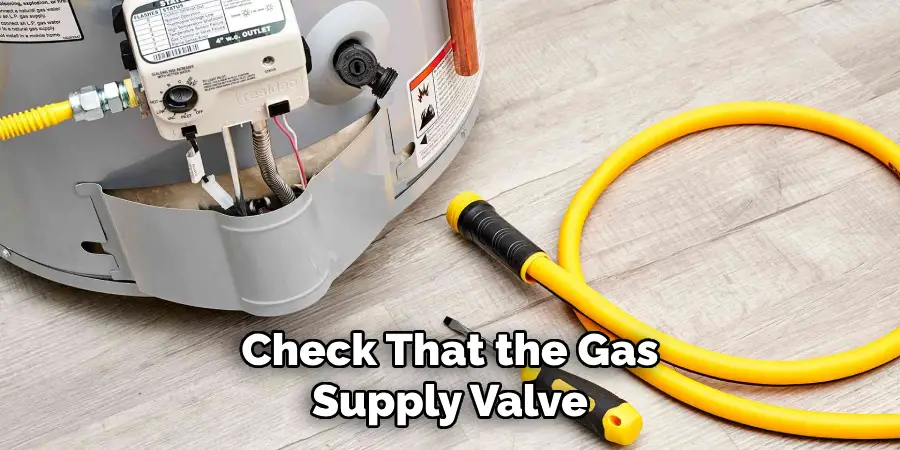
9. Inspect Electrical Connections:
For electric water heaters, beeping alarms may indicate issues with electrical connections or components. Inspect the wiring, terminals, and connections on the water heater for signs of damage, corrosion, or loose connections. Tighten any loose connections and replace damaged wiring as needed.
10. Consult the Owner’s Manual:
If you’re unable to determine the cause of the beeping or resolve the issue on your own, consult the owner’s manual provided by the manufacturer. The manual may contain troubleshooting tips, error code explanations, and guidance on resolving common issues with your specific model of water heater.
Troubleshooting Tips for Persistent Beeping
When dealing with a water heater that continues to beep even after attempting the standard troubleshooting methods, a more in-depth approach may be required. These steps can help identify and resolve the underlying issues causing persistent beeping:
- Consult a Professional: If the beeping persists despite your troubleshooting efforts, it may indicate a more serious problem that requires professional attention. A qualified plumber or HVAC technician can diagnose and repair complex issues that are not easily resolved by homeowners.
- Check for Software or Firmware Updates: For water heaters equipped with smart technology, ensure that the device’s software or firmware is up to date. Manufacturers often release updates that can improve performance and resolve bugs causing the beeping.
- Perform a Comprehensive System Check: A thorough inspection of the entire water heating system, including connected pipes, fittings, and electrical systems, may reveal issues not directly related to the water heater itself but affecting its performance.
- Review Warranty and Service Options: If your water heater is still under warranty, review the terms and conditions. Some issues causing the beeping may be covered under the warranty, allowing for free or reduced-cost repairs.
- Consider Age and Replacement: Evaluate the age of your water heater against the average lifespan of similar models. If your unit is nearing or beyond its expected service life, replacement may be a more cost-effective and reliable solution than extensive repairs.
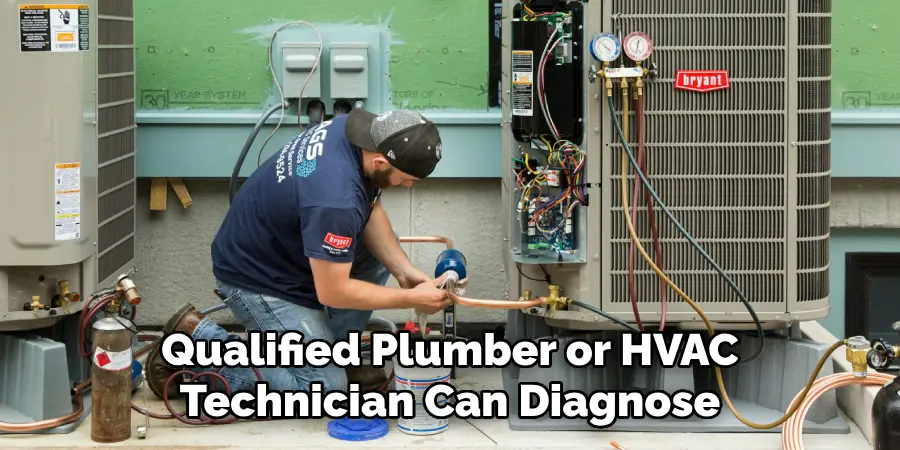
By following these troubleshooting tips for persistent beeping, homeowners can ensure the safety, efficiency, and longevity of their water heating systems.
Inspecting Temperature and Pressure Levels
Regular inspection of temperature and pressure levels is crucial for the safe and efficient operation of water heaters. An imbalance in either can lead to performance issues or even safety hazards. Here’s what you need to know:
- Check the Temperature Setting: Ensure the water heater’s temperature is set within the recommended range, typically between 120°F to 140°F. Settings above this range can increase the risk of scalding and contribute to mineral buildup in the tank, reducing efficiency.
- Inspect the Temperature Gauge: If your water heater has a temperature gauge, regularly check it to ensure the system is heating water to the desired temperature. Inconsistencies might indicate a malfunctioning thermostat or heating element.
- Monitor Pressure Levels: The normal water pressure for a residential system is typically between 40 to 60 psi. Excessive pressure can cause the water heater to overwork, increasing the risk of leaks or tank damage. Install a pressure gauge on the water line if your system doesn’t already have one to monitor these levels.
- Test the Pressure Relief Valve: This valve releases water if pressure or temperature exceed safe levels, preventing the tank from exploding. Test the valve by lifting the lever and letting it snap back. You should hear a gurgling sound as water is briefly discharged into the drain tube. If no water flows or if the valve doesn’t close properly, it needs to be replaced.
- Addressing High Pressure: If you consistently experience high pressure, consider installing a pressure-reducing valve on the main water supply and an expansion tank on the water heater. These devices can help manage and reduce pressure fluctuations that may harm your water heater.
Inspecting temperature and pressure levels regularly not only contributes to the safety of the household but also ensures the longevity of the water heater by preventing unnecessary strain on its components. Ignoring these factors can lead to inefficiency, increased energy costs, and the premature failure of the water heater.
Conclusion
In conclusion, addressing a beeping water heater promptly is crucial for maintaining a safe and efficient home environment. By following the steps outlined in this guide, homeowners can effectively identify the source of the beeping and take appropriate action to silence it. Troubleshooting common issues such as power supply interruptions, temperature fluctuations, and pressure abnormalities can help resolve the problem.
Additionally, implementing preventive measures like regular maintenance and monitoring temperature and pressure settings can reduce the likelihood of future beeping occurrences. Thanks for reading, and we hope this has given you some inspiration on how to stop water heater from beeping!

